It’s time to talk about a challenging topic that’s been on a lot of hearts lately: Pastor burnout.
As you know, ministry can be an incredibly rewarding and fulfilling calling. It can also be deeply challenging and exhausting. And unfortunately, many pastors are struggling with burnout and discouragement at historic levels.
How quickly have things changed?
In 2015, 72% of pastors said they felt “very satisfied” with their job as pastors.
In late 2022, just 52% of pastors were “very satisfied with their jobs.”
That’s a staggering 20% drop over the course of six years—and it’s a trend no ministry leader can afford to ignore. Between emotional exhaustion, chronic stress, and the ramp-up in pastors experiencing burnout, ministry has never felt more difficult.
Barna CEO David Kinnaman recently told me, “A drop in the level of pastoral health drop this significant in just 7 years isn’t just unprecedented, it signals a crisis that the church has to address.”
I couldn’t agree more.
You’re not alone if you’re struggling as a pastor or church leader. Pastors are burned out, tired of ministry, and exhausted at historic levels.
To make matters worse, and as you’ll see in the statistics below, the crisis is more acute with younger church leaders than it is with older pastors. Given that the average senior pastor is in his or her late fifties, the coming succession crisis might worsen as younger leaders burn out or tap out.
According to new Barna research, five areas, in particular, have seen significant drops. We’ll look at each in turn.
Note: This article references exclusive content available in Barna’s Resilient Pastor Initiative. You can access the report and more through Barna Access.A drop in the level of pastoral health drop this significant in just 7 years isn’t just unprecedented, it signals a crisis that the church has to address. @barnagroupCLICK TO TWEET
1. Pastors’ Overall Well-Being Has Taken a Hit
The overall well-being of pastors has hit a disturbing low.
The overall well-being of pastors has hit a disturbing low. If you think that’s hyperbole or an exaggeration, consider the following data.
In just seven years, pastors reporting ‘Excellence’ in their:
- Spiritual well-being dropped from 37% to 14%
- Physical well-being fell from 24% to 9%
- Mental and emotional health plummeted from 39% to 11%
- Overall quality of life dipped from 42% to 18%
- Level of respect they felt from the community tanked from 22% to 10%
- Level of ‘true friends’ dropped by 50% from 34% to 17%
The overall well-being of pastors has hit a disturbing low.CLICK TO TWEET
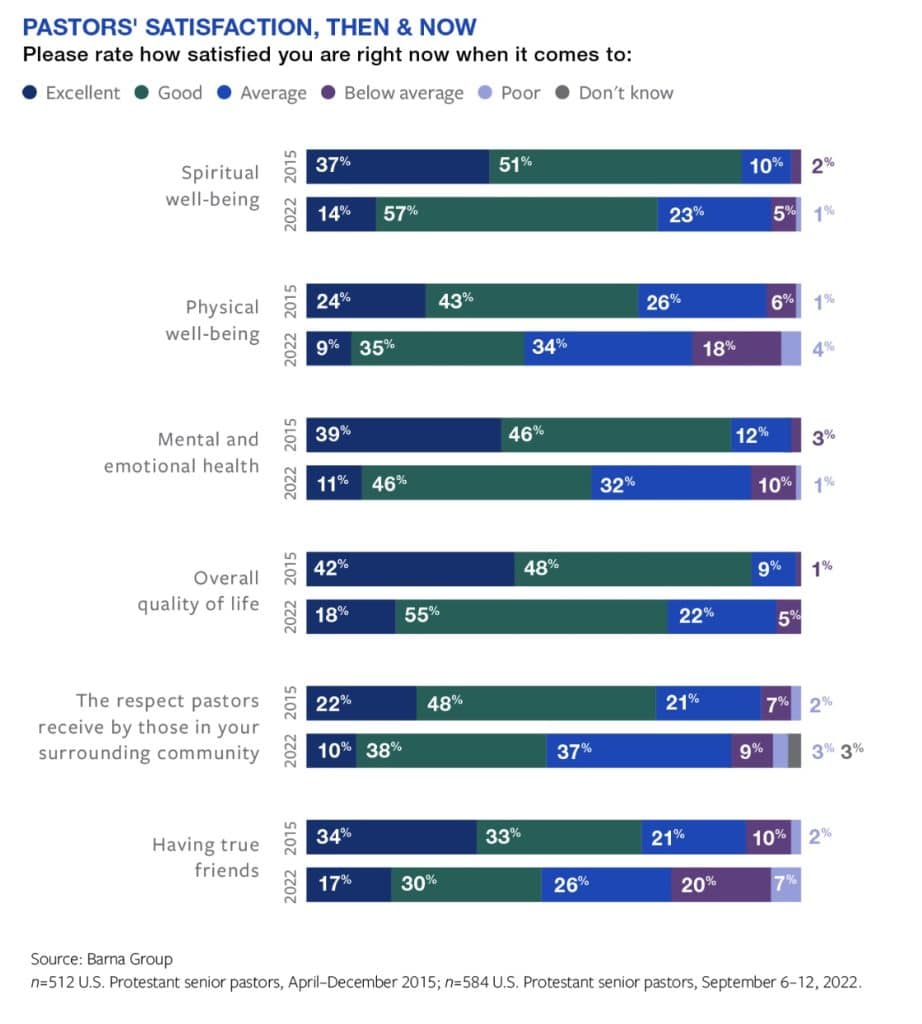
This has implications beyond just the health of senior pastors and their staff. Because the health of a leader impacts the health of a church, we’ll see a ripple effect of pastoral exhaustion that could damage churches for years to come.Because the health of a leader impacts the health of a church, we’ll see a ripple effect of pastoral exhaustion that could damage churches for years to come.CLICK TO TWEET
2. Pastors’ Confidence in Their Calling Is Plummeting
In addition to the 20% dip in pastors’ satisfaction with their calling (outlined above), pastors are questioning their call to their current church.
In 2016, 53% of pastors said they were ‘Very Satisfied’ with their current church. Today, only 38% say they’re very satisfied with their current church.
In a similar vein, in 2015, 66% of pastors said they felt more confident in their calling into ministry than they did when they first entered ministry. Today, only 35% of pastors say they feel more confident in their calling than when they started.
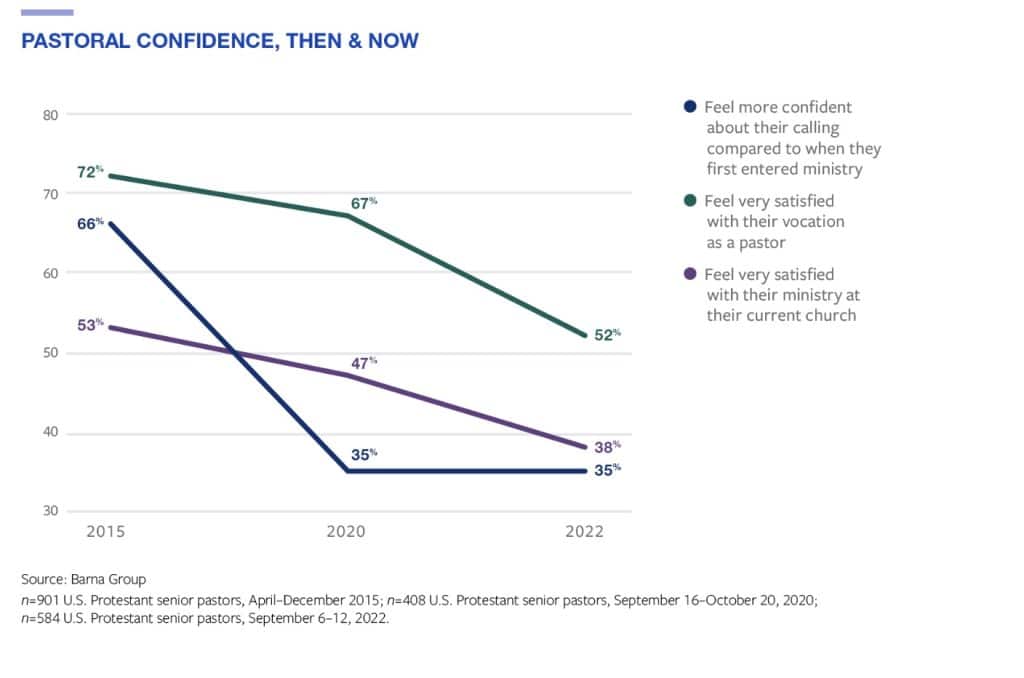
And as anyone in ministry knows, it’s hard to continue in ministry when you regularly question your call to ministry. Something’s got to give.It’s hard to continue in ministry when you regularly question your call to ministry.CLICK TO TWEET
3. Pastor Burnout Has Reached a “Five-Alarm Fire” Level
An astonishing 40% of pastors now show a high risk of burnout. That’s an almost 400% increase since 2015, when that number was just 11%.
One of the most quoted statistics in the last few years has been the results to this question from Barna: “Have you given real, serious consideration to quitting being in full-time ministry within the last year?“
The trends are below in this chart, but in 2022, over 40% consistently answered yes when asked if they seriously considered throwing in the towel.
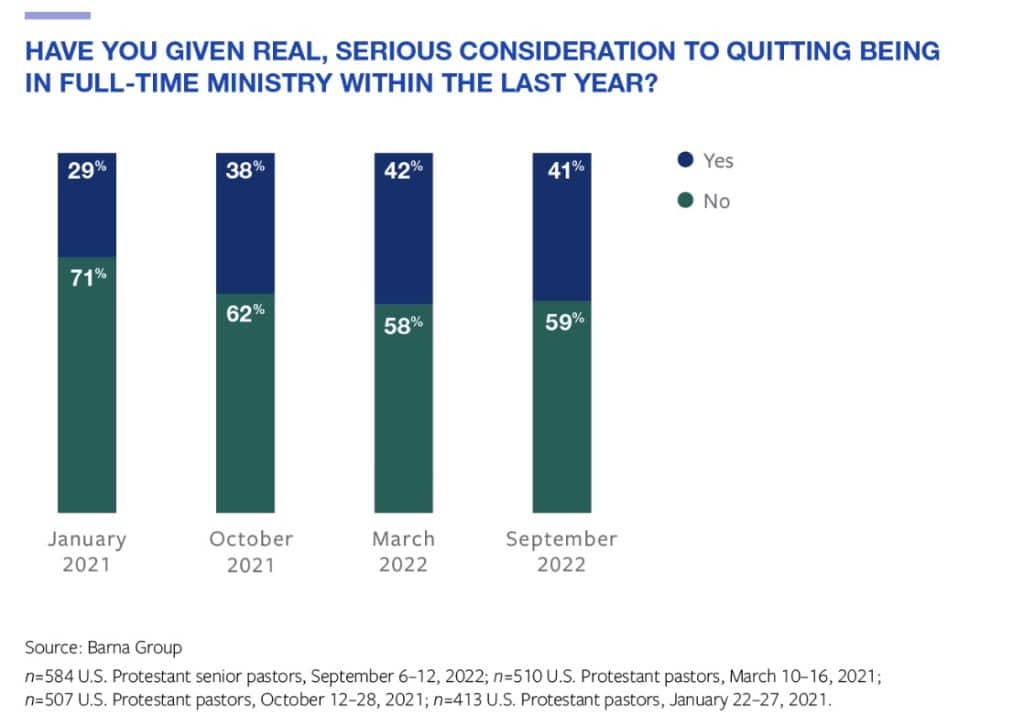
As the demands and polarization of many congregations escalate, social shifts continue unabated, and pastors grow more isolated, a perfect ministry storm for burnout has moved in.
An astonishing 40% of pastors now show a high risk of burnout. That’s an almost 400% increase since 2015 when that number was just 11%.An astonishing 40% of pastors now show a high risk of burnout. That’s an almost 400% increase since 2015 when that number was just 11%.CLICK TO TWEET
Among pastors who are considering quitting, burnout risk skyrockets to 69%. But 21% of pastors who are not seriously thinking of leaving ministry are still at high risk of burnout.
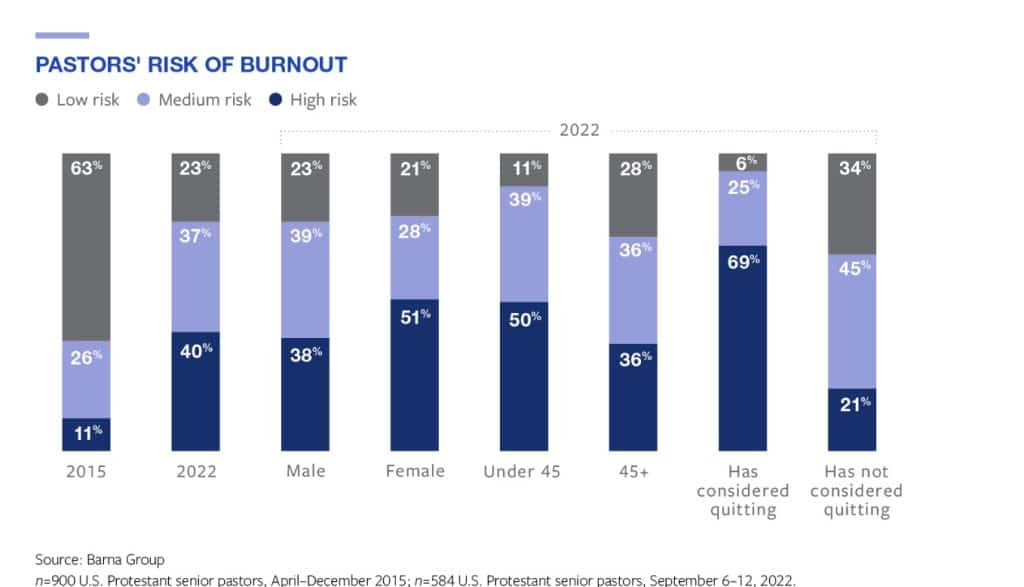
The challenge with burnout is that if you don’t declare a finish line, your body will.
Right now, that risk is at an all-time high.As the polarization of most congregations escalates, social shifts continue unabated, and pastors grow more isolated, a perfect ministry storm for burnout has moved in.CLICK TO TWEET
4. Young Pastors and Women Are Being Hit the Hardest
Not all pastors are struggling at the same level.
Two trends emerge: According to the latest research, the younger the pastors is, the deeper the struggle is. Only 35% of pastors under the age of 45 are ‘Very Satisfied’ with their vocation as a pastor, compared to 58% of those 45 or older.
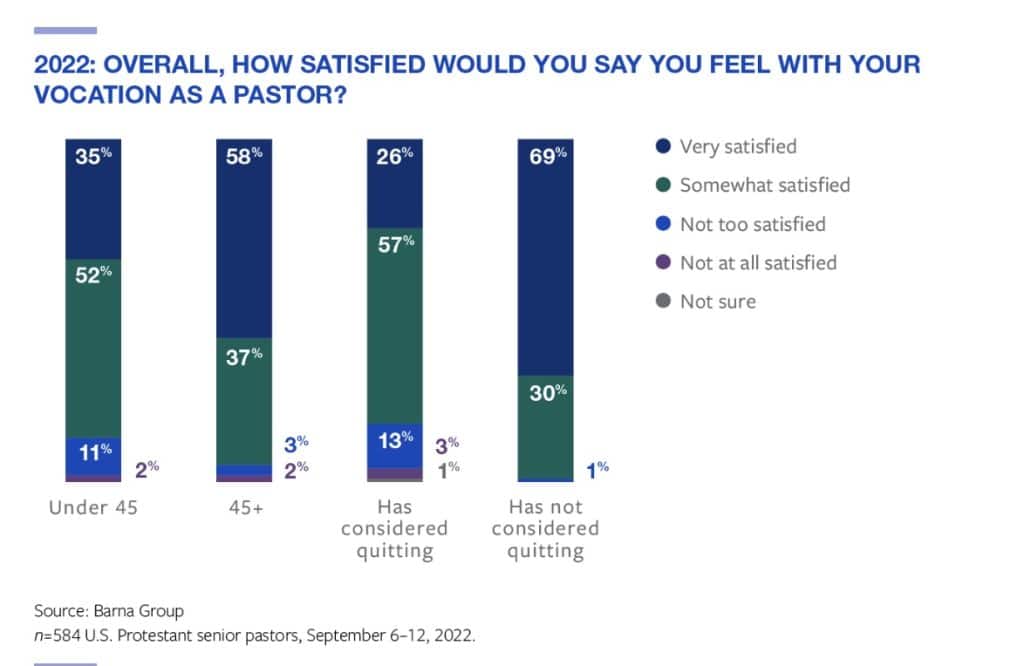
Women have also been hit hard by discouragement in ministry. 52% of male pastors say they are just as confident about their calling as when they started; only 42% of women express the same confidence.
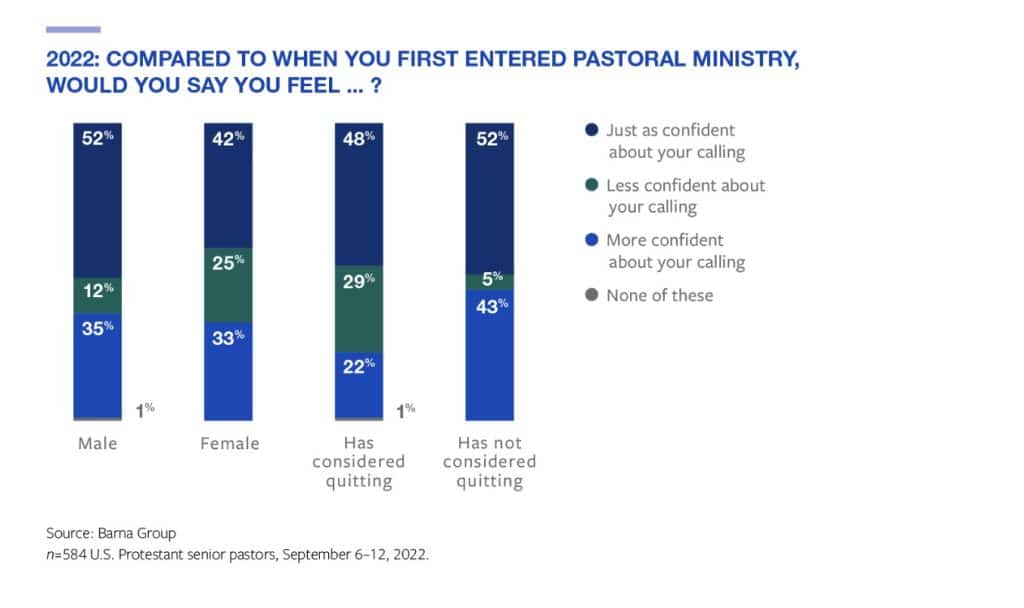
Even more alarming, while 40% of all pastors are at high risk of burnout (see the chart in Point 3 above), 51% of women in church leadership and 50% of pastors under 45 are at high risk of burnout. Only 36% of pastors over 45 are at high risk of burnout.
It’s heartbreaking when many of the people who carry the present and future of the church—young leaders and women— are at their breaking point.It’s heartbreaking when many of the people who carry the present and future of the church—young leaders and women— are at their breaking point.CLICK TO TWEET
5. Pastors Don’t Feel Supported
As we move toward solutions, a few more statistics show you that the very medicine pastors need is something they appear not to be taking.
Take community support. Barna asked pastors: “How often, if ever, do you receive spiritual support, whether from a network of peers or from a mentor?”
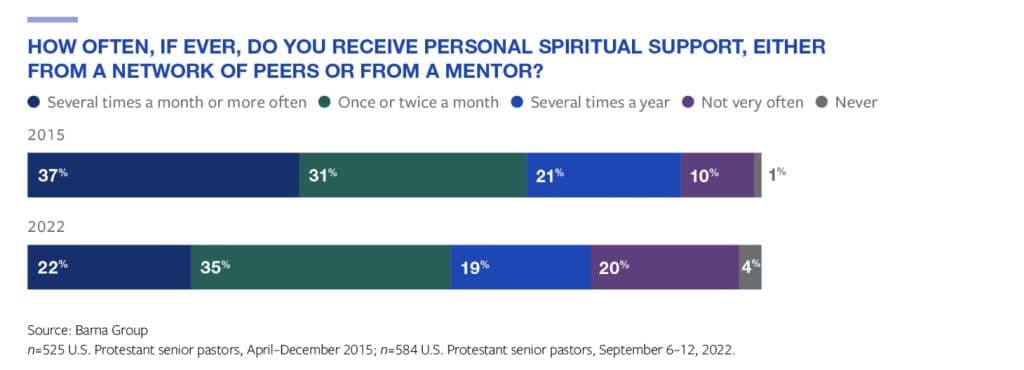
In 2015, 37% of pastors answered they receive that kind of support several times a month or more.
In 2022, only 22% of pastors said they had any regular support.
Drilling down further, only 11% of pastors said they went to a professional counselor, 8% saw a therapist, and only 13% sought out a spiritual advisor. Fully 63% of pastors said they never sought out any kind of support.
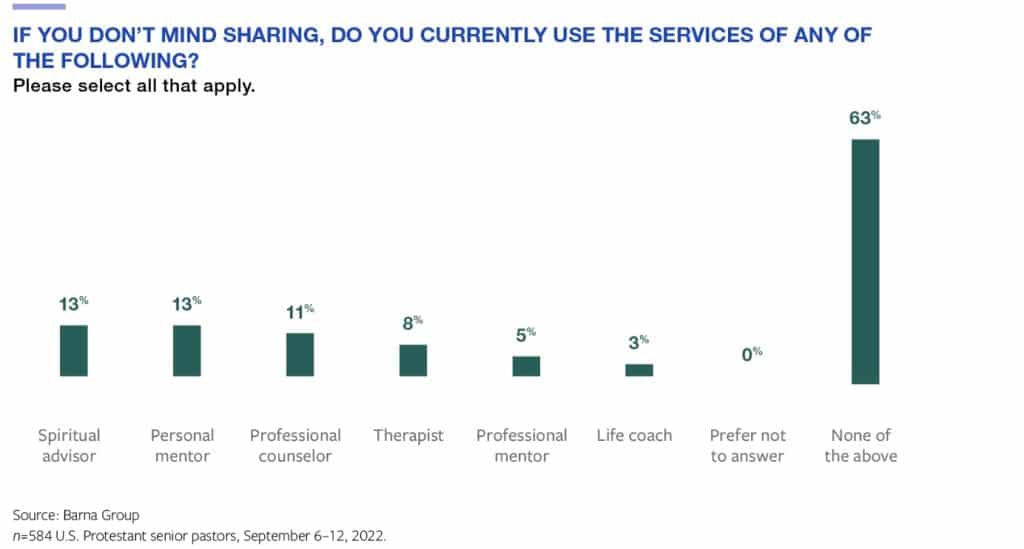
Self-care doesn’t seem to be providing a solution either.
When pastors were asked what they do to recharge, 76% of pastors cited ‘spending time with family,’ 72% said they got rest or slept, and 66% said they prayed. Only 25% of pastors said they sought out things that inspired them, while 20% said they went to counseling or therapy.
There’s nothing wrong with spending time with family or getting sleep. Church leaders need more of that. But it’s hardly a recipe for curing burnout.
The data shows that most pastors don’t appear to have even the beginning of a plan to get healthy or truly restore themselves in their time off.
Instead, most pastors continue to isolate themselves from any real help.
The problem with that is that solitude is a gift from God. Isolation is a tool of the enemy.The data shows that most pastors don’t appear to have even the beginning of a plan to get healthy or truly restore themselves in their time off.CLICK TO TWEET
So, What Do We Do?
When you consider the state of mental health among church leaders, the analysis is sobering.
This isn’t a time for guilt and shame, though, it’s a time for help. Too many pastors feel burned by their work to feel burned by their data.
Here are a few things that can help nurture pastors back to health:
i. Take the state of affairs seriously
We’re nearing the point in the church where if we don’t take pastoral health seriously, our ill health will take us.
We’re nearing the point in the church where if we don’t take pastoral health seriously, our ill health will take us.
It’s too easy to look at data this stark and conclude that ‘COVID was tough’. A collapse in pastoral health this deep doesn’t happen because of a pandemic (as challenging as that was).
While it’s impossible to say exactly why things are trending the way they are, it’s essential to realize this isn’t just a season of ministry.
We often write off ill health by saying, “It’s just a busy season.” Seasons have beginnings, and seasons have endings. If your busy season has no end, it’s not a season, it’s your life.We’re nearing the point in the church where if we don’t take pastoral health seriously, our disease will take us.CLICK TO TWEET
ii. Understand the depth of the problem (Hint: This is personal)
I went through a season of burnout years ago and can relate to the struggle. On my personal road to burnout, I kept thinking the rules didn’t apply to me – there was no way I could burn out.
The problem is that the rules never apply to you until they do. And then, it’s too late.
That’s exactly what happened to me.When it comes to burnout, the rules never apply to you until they do. And then, it’s too late.CLICK TO TWEET
In the 17 years since my burnout, I’ve lived with a very deep sense of how fragile and frail I really am. Paradoxically, that kind of awareness and respect for what can go wrong in the human soul has made me stronger, not weaker. But I wake up each day fully realizing I’m a few bad decisions and choices from hitting the ditch again.
The greatest threat to your ministry is not what’s happening around you, but what’s happening within you. Take care of yourself, so that you can continue to care for others.The greatest threat to your ministry is not what’s happening around you, but what’s happening within you. Take care of yourself, so that you can continue to care for others.CLICK TO TWEET
iii. Get Some Help
You didn’t burn out by yourself, and you can’t get well by yourself either. For me, it took counselors, coaches, friends, family, and a great community of support.
You won’t be any different.You didn’t burn out by yourself, and you can’t get well by yourself either.CLICK TO TWEET
Take a look again at the data in Point 5 above. The isolation church leaders are living in only makes things worse, not better.
The best first step in dealing with burnout is to tell a friend who loves you enough to tell you the truth and ensure you get professional help.
I promise you that my team and I are doing all we can to help reverse the decline in the church, which starts with the leaders’ health. I have more practical resources that will help, but please know you can’t do this alone.
The future of a healthy church starts with leaders who are committed to getting healthy.
Breaking the silence and getting help is a meaningful first step in the right direction.The future of a healthy church starts with leaders who are committed to getting healthy.CLICK TO TWEET
Lead With Confidence and Clarity. Grow Your Church.
As leaders, we tend to see the challenges and roadblocks before other people do.
We’ve all been there before…
- You need to refresh your vision for the future but know that change will be an issue for that person.
- You’re overstaffed (or missing a key role) and can’t find the right person to fill the role.
- You aren’t reaching enough new people even though you’ve tried everything that’s working for other churches.
- You can see the issue but aren’t confident in what to do about it.
And with another Sunday morning coming up, it’ll just have to wait until next week when you have a few minutes to figure it out.
Now ask yourself this:
What would it feel like to have those answers at your fingertips 24/7?
Whether it’s reaching new people, improving your preaching, increasing volunteers, refreshing your vision, engaging your staff, or any of the countless challenges we face as church leaders, The Art of Leadership Academy will equip you to lead your church with confidence and clarity.
Between comprehensive church leadership courses, live coaching calls, staff and volunteer training resources, and direct access to an online community of senior-level church leaders, you’ll get the exact insights and answers that fuel your church for growth.







